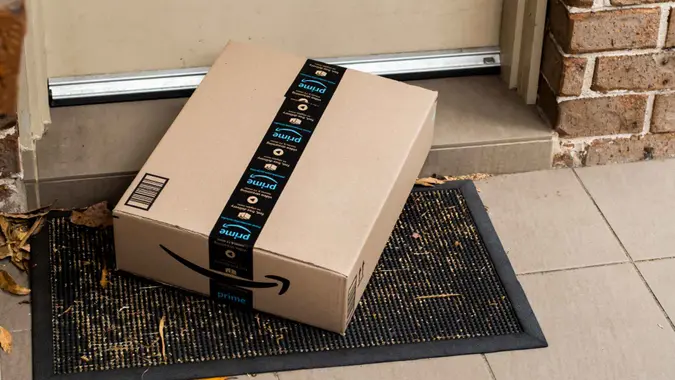10 Easy Ways To Save Money on Recurring Expenses

Commitment to Our Readers
GOBankingRates' editorial team is committed to bringing you unbiased reviews and information. We use data-driven methodologies to evaluate financial products and services - our reviews and ratings are not influenced by advertisers. You can read more about our editorial guidelines and our products and services review methodology.

20 Years
Helping You Live Richer

Reviewed
by Experts

Trusted by
Millions of Readers
You may not realize just how much money you are actually spending per month. Not every expense is set in stone or unavoidable, and if you can carve out some savings, all the better. Saving a little here and there can add up to big savings overall.
10 Tips To Save Money on Monthly Expenses
Recurring costs like mortgage payments, student loans, utility bills and car payments are unavoidable, but this doesn’t mean you cannot cut costs. Learning how to cut your monthly expenses and how to avoid spending too much can lead to a lot of savings in the future. You can follow these tips to create a budget and decide what debt payments to prioritize.
- Organize your monthly income
- Create a budget
- Stop paying for storage you don’t need
- Automate your fixed expenses on one card
- Use gift cards to pay certain bills
- Cancel gym memberships you don’t use
- Plan and cook your own meals
- Remove recurring convenience deliveries
- Cut back on streaming services
- Take public transportation
1. Organize Your Monthly Income
Take the time to do a thorough check of your finances. You can write it down or use an app like YNAB or Mint. A lot of credit cards and bank accounts will show you which charges are recurring monthly. You can usually find this information under your account manager settings.
Once you have you have a picture of your income, you can clearly see how much money might be wasted on unnecessary monthly expenses.
2. Create a Budget
The next step after organizing your monthly income is to make a budget. Creating a budget can be as simple as the 50/30/20 rule. This advises you to save 20% of your income every month. That leaves 50% for needs, including essentials like mortgage or rent and visits to the grocery store. The remaining 30% of your income is for discretionary spending.
3. Stop Paying for Storage You Don’t Need
Whether it’s virtual storage like Dropbox or a physical storage unit, consider how much space you really need and reduce expenses by streamlining what you purchase.
You might even be able to make some extra cash by selling items from your storage unit. This would allow you to downgrade to a smaller unit or even get rid of your storage unit rental payment altogether.
4. Automate Your Fixed Expenses on One Card
Using the same card for all your recurring monthly expenses can help you track spending. You can even set up an alert to see when these go through. Knowing the day they are charged will make it easier to budget for.
5. Use Gift Cards To Pay Certain Bills
If you receive gift cards for special events or birthdays, you can use them for your monthly expenses. Using gift cards makes it easy to track specific bills because when the funds are depleted on the card, you’ll need to log into your account and add a new card.
You can take that opportunity to evaluate if you still need or want the service. Even if you don’t receive gift cards from friends or family, you can purchase cards yourself to use for subscription services. You might even be able to cash in credit card rewards to buy the gift cards at a discount.
6. Cancel Gym Memberships You Don’t Use
Canceling gym memberships or fitness subscriptions is an easy way to save money. With so many free, at-home workouts available, not to mention running, walking, hiking or cycling, a gym membership may be a luxury you don’t need.
While you’re at it, take a look at any online fitness classes or health and fitness apps that you no longer need or use. You can find plenty of free videos on YouTube or streaming services to keep you moving, and Facebook is full of free fitness support communities to help you stay motivated.
7. Plan and Cook Your Own Meals
Planning ahead and cooking at home can save you a ton of money. Start small by planning a week of meals and creating a grocery list from that. Once you know what groceries you need, you can check for sales or coupons at grocery stores near you. You could even plan to use your leftovers the next day, saving you time and money.
8. Remove Recurring Convenience Deliveries
Most online sites offer the convenience of having automatic shipments delivered to you every month. While this service is very helpful and may be necessary for some items, as time goes on, you may find that you no longer need some of these.
Even if you don’t cancel these monthly subscriptions, consider cutting back to less frequent deliveries to save money.
9. Cut Back on Streaming Services
More and more people have cut the cord on cable and opted for streaming services instead. But you can save even more by minimizing your streaming services to one or two with shows you really love.
Look at each of the services you subscribe to and be honest with yourself about how much time you spend using each. Even if you cut one, that is money back in your pocket.
Good To Know
While you’re reviewing what you pay to stream videos and music, make sure you aren’t paying for two subscriptions for your household when one will do. Most of these services offer a family version. Sometimes this upgrade will cost more but if you are paying for two subscriptions, it might save you money.
10. Take Public Transportation
If you don’t have too long a commute you could consider taking public transit to save on gas money or general car maintenance. If you try this for a while, you may not even miss having a car. In this case, you could sell it which would give you a nice nest egg to start an emergency fund or even pay off other debts. Interest rates alone on auto loans can add heavily to your monthly expenses so alleviate this when possible.
Final Take To GO
You can review a list of all your monthly expenses and go line by line to decide which ones you don’t need. Or you can take the extreme route and cancel virtually everything for a month, especially if you’re spending a lot of money on website subscriptions, mobile apps or streaming services. If you miss the service, you can always add it back but you will know that it is worth the cost.
FAQ
Here are the answers to some of the most frequently asked questions about monthly expenses.- What is a normal monthly expense?
- There are many monthly expenses you have to budget for including utility bills, rent, mortgage payments, credit cards or other fixed expenses.
- What are the five examples of expenses?
- Here are five examples of recurring expenses:
- Streaming services
- Gym memberships
- Utilities
- Credit cards
- Groceries
- Here are five examples of recurring expenses:
Caitlyn Moorhead and Elizabeth Constantineau contributed to the reporting for this article.
 Written by
Written by  Edited by
Edited by 

























